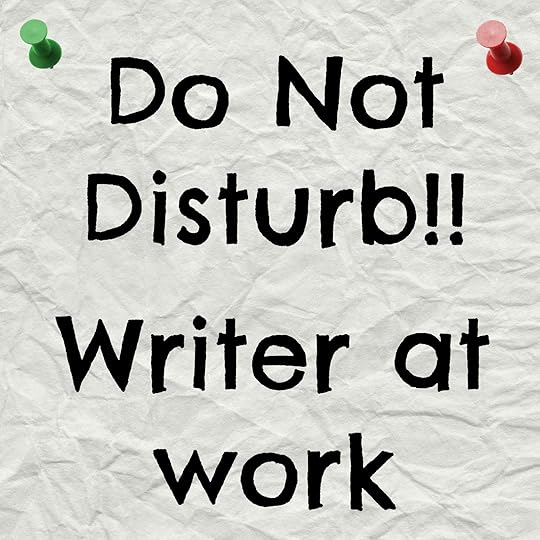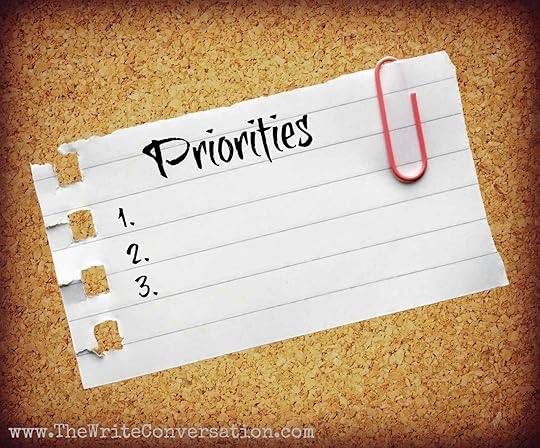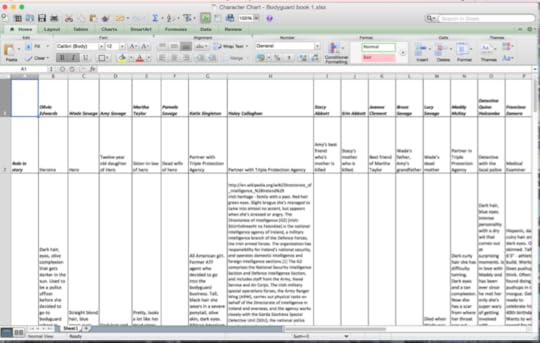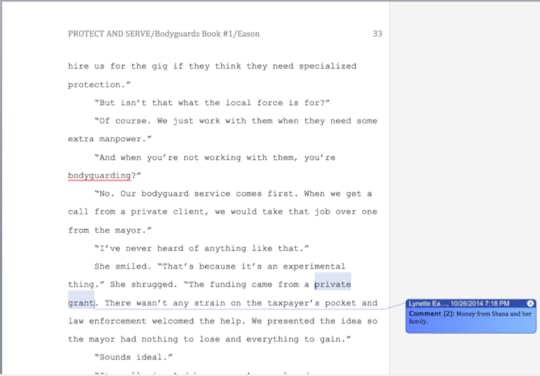Edie Melson's Blog, page 395
November 11, 2014
Indie Tuesday—Easy Ways to Reach Word Count
 By: Jessica Keller @AuthorKeller
By: Jessica Keller @AuthorKellerAre you participating in NaNoWriMo? Then word count is probably on your mind right now. One of the main traits of a successful indie/hybrid author is the ability to write prolifically. Most research shows that indie authors don’t start making decent money until they have at least three books out (and usually a series). In most cases, it’s suggested to have the first three books out within a six month time period. This feeds the Amazon algorithms, therefore sparking more sales and more discoverability for your books.
There are secrets to meeting word count that don’t involve sitting in an office for 10 hours a day. Believe me. I work a full-time day job and I have a two year old. Translation: I don’t write full-time. Not even close. But between my trade contracts and my indie books I’ll have had four books release in 2014 and I’m looking at closer to six next year. Madness, right?
How does someone write that much?
I used to really struggle with the fact that I don’t have huge chunks of devoted time to write. When my daughter was born I lost my weekends which I used to depend upon in order to work on my manuscripts, and yet, since her birth I’ve written more books (and blogs and magazine articles) than I ever did in all the years prior. The thought that pushes me forward is that while thinking about a book and plotting a book is great, those things don’t get words on the screen, so they don’t count.
Here are a few tricks I use to get my word count up. First though, you’ll need to buy a good laptop bag because it’s going to become your new best friend.
Dedicated Time

This is planned time during the week that I spend writing. I treat these as business hours that are not to be disturbed for any reason. For me, this dedicated time falls after my daughter is asleep four nights a week for 2-3 hours before bed. When 8pm (my start time) hits, I stop whatever I’m doing and head to my office. No more dishes. No more checking Facebook. I put down my phone, turn off the WiFi on my computer, and lock myself away in my office.
If you set up dedicated writing time, make sure everyone in your family understands that you're not to be interrupted during those hours. Make a sign and hang it on he door to the room if you must. Unplug from everything else and get lost in your story. Don't shrug off this dedicated time for any reason. If this goes, your manuscript will get far off track very quickly. Stolen Time
 This is the big one for me. Stolen time allows me to write the amount of books I do. Remember when I told you to buy a new laptop bag? That’s for stolen time.I carry my laptop with me everywhere. To my day job, to the doctor’s office, to my car’s oil change, to the grocery store—everywhere. The second I have ten minutes of spare time, I fire up my laptop and get in as many words written as I can. My commute in the morning can be anywhere from forty-five minutes to an hour an fifteen minutes. I build in a travel cushion and usually arrive at work twenty minutes early, and you guessed it—I write in the parking lot until it’s time to go in to work. I write on my thirty minute lunch. Any chance I find, I get in another 50-500 words.Do you cook dinner? Meal prep time is a great way to get some words in. Put your laptop on the counter and while the chili is bubbling away: start typing. Waiting for water to boil? Stand there and write. I can get 100-200 words done before a pot starts boiling for pasta. It all adds up. Don’t want to lug around a laptop? No problem. If you have a smartphone then you have a notes function on it. Write in your notes app and then email it to yourself each day. Authors DawnCrandall and Kristy Cambron both wrote and edited their books almost entirely on their iPhones. Isn’t that incredible? No smartphone? A pad of paper and/or a voice recorder still work wonders. Often on my hour long commute I’ll bring along a voice recorder and dictate dialogue to copy down later. Retreat TimeThis is planned time away from normal life either alone or with other writers for the sole purpose of writing as much as possible. When I’m under a tight deadline I’ve been known to rent a hotel room for an evening and write for 20+ hours in a weekend. This method requires a supportive spouse and a free weekend. Remember, if you shoot for just 1,000 words a day—every day—that’s 365,000 words a year which breaks into four long novels or six short novels. That adds up to a ton of progress with only an hour or so of work a day. Are you doing NaNoWriMo? What’s your biggest obstacle to meeting word count each day? Where can you find small pieces of time squeeze some words in? Any suggestions I might have missed?
This is the big one for me. Stolen time allows me to write the amount of books I do. Remember when I told you to buy a new laptop bag? That’s for stolen time.I carry my laptop with me everywhere. To my day job, to the doctor’s office, to my car’s oil change, to the grocery store—everywhere. The second I have ten minutes of spare time, I fire up my laptop and get in as many words written as I can. My commute in the morning can be anywhere from forty-five minutes to an hour an fifteen minutes. I build in a travel cushion and usually arrive at work twenty minutes early, and you guessed it—I write in the parking lot until it’s time to go in to work. I write on my thirty minute lunch. Any chance I find, I get in another 50-500 words.Do you cook dinner? Meal prep time is a great way to get some words in. Put your laptop on the counter and while the chili is bubbling away: start typing. Waiting for water to boil? Stand there and write. I can get 100-200 words done before a pot starts boiling for pasta. It all adds up. Don’t want to lug around a laptop? No problem. If you have a smartphone then you have a notes function on it. Write in your notes app and then email it to yourself each day. Authors DawnCrandall and Kristy Cambron both wrote and edited their books almost entirely on their iPhones. Isn’t that incredible? No smartphone? A pad of paper and/or a voice recorder still work wonders. Often on my hour long commute I’ll bring along a voice recorder and dictate dialogue to copy down later. Retreat TimeThis is planned time away from normal life either alone or with other writers for the sole purpose of writing as much as possible. When I’m under a tight deadline I’ve been known to rent a hotel room for an evening and write for 20+ hours in a weekend. This method requires a supportive spouse and a free weekend. Remember, if you shoot for just 1,000 words a day—every day—that’s 365,000 words a year which breaks into four long novels or six short novels. That adds up to a ton of progress with only an hour or so of work a day. Are you doing NaNoWriMo? What’s your biggest obstacle to meeting word count each day? Where can you find small pieces of time squeeze some words in? Any suggestions I might have missed?TWEETABLES
Participating in #NaNoWriMo - here are three easy ways to reach your word count. -via @AuthorKeller (Click to Tweet)
Want to write 4+ books a year? Follow these tricks for high word counts #indiepub #publishing #NaNoWriMo @AuthorKeller (Click to Tweet)
 Jessica Keller holds degrees in both Communications and Biblical Studies. She is multi-published in both Young Adult Fiction and Inspirational Romance and has 100+ magazine and newspaper articles to her name. Her latest indie release is Searching for Home. She also has a speaking ministry and loves to talk books. Jessica lives in the Midwest with her amazing husband and their very giggly daughter.
Jessica Keller holds degrees in both Communications and Biblical Studies. She is multi-published in both Young Adult Fiction and Inspirational Romance and has 100+ magazine and newspaper articles to her name. Her latest indie release is Searching for Home. She also has a speaking ministry and loves to talk books. Jessica lives in the Midwest with her amazing husband and their very giggly daughter.Connect with Jessica through her Website, blog, Facebook, Amazon Page, and on Twitter.
Published on November 11, 2014 01:00
November 10, 2014
Social Media Monday—My Grandmother Would Approve of Social Media
by Edie Melson @EdieMelson
 I believe social media is a return to a
I believe social media is a return to a
simpler age.Social media is a return to a simpler age. And I'm convinced that my grandmother would approve of social media. More than that, I think she'd have enjoyed it.
I can see the skepticism on your faces from here, but bear with me. I think you’ll see the connection.
First, I’d like to invite you to remind yourselves of the standards I, and a lot of you, were taught growing up. We were raised by certain ideas about how to treat others. My mother and grandmother had a name for it—polite society.
Here are some of the basics, in case you’ve forgotten: If someone says something nice about you, thank them.When someone does something nice for you, do something nice for them.Always put others before yourself.If you can’t say something nice, don’t say anything at all.
It was a Do unto others as you would have them do unto you world.
 Operating from a common basis makes navigation easier.These rules guided my behavior in almost all circumstances. And they made the world I lived in pretty easy to navigate. We all operated from a common basis, and everyone knew what was expected from everyone else.
Operating from a common basis makes navigation easier.These rules guided my behavior in almost all circumstances. And they made the world I lived in pretty easy to navigate. We all operated from a common basis, and everyone knew what was expected from everyone else.
These same basic rules are once again enjoying a resurgence—on the Internet. Stay with me and consider our interaction on social media, specifically Facebook and Twitter.If someone mentions you (which is a nice thing in this new, platform-building paradigm) you thank them.When others do something nice for you online, like telling people you have a great blog post, you tell your friends about their blogs.To keep from becoming a self-centered sounding boor, promote others online more than yourself. I know it’s counterintuitive, but it works every time. Those who promote others are always more popular and have more friends than those who are self-serving and self-promoting.And most important of all, when almost everything ever said online can still be found somewhere online—NEVER share an update that puts someone else down.
It’s once again a golden-rule governed world.
 It's once again a golden-rule governed rule.When I realized the relationship between how I was raised and this new frontier, I also saw that I have a lot of experience I can share with the younger, sometimes more digitally-familiar generation. And this gave me the confidence to embrace this new culture. Because let’s face it, there truly is nothing new under the sun.
It's once again a golden-rule governed rule.When I realized the relationship between how I was raised and this new frontier, I also saw that I have a lot of experience I can share with the younger, sometimes more digitally-familiar generation. And this gave me the confidence to embrace this new culture. Because let’s face it, there truly is nothing new under the sun.
So here's my challenge to you. We tend to focus on the difficulties of connecting to others through this new digital paradigm. Instead, what similarities have you found between connecting digitally and connecting physically with other people. Don't forget to join the conversation!Blessings
Edie
TWEETABLESIs #SocialMedia is actually a return to a simpler time? @EdieMelson shares her thoughts (Click to Tweet)
#socialmedia has a lot of similarities to the way our grandmothers connected - @EdieMelson (Click to Tweet)
 I believe social media is a return to a
I believe social media is a return to asimpler age.Social media is a return to a simpler age. And I'm convinced that my grandmother would approve of social media. More than that, I think she'd have enjoyed it.
I can see the skepticism on your faces from here, but bear with me. I think you’ll see the connection.
First, I’d like to invite you to remind yourselves of the standards I, and a lot of you, were taught growing up. We were raised by certain ideas about how to treat others. My mother and grandmother had a name for it—polite society.
Here are some of the basics, in case you’ve forgotten: If someone says something nice about you, thank them.When someone does something nice for you, do something nice for them.Always put others before yourself.If you can’t say something nice, don’t say anything at all.
It was a Do unto others as you would have them do unto you world.
 Operating from a common basis makes navigation easier.These rules guided my behavior in almost all circumstances. And they made the world I lived in pretty easy to navigate. We all operated from a common basis, and everyone knew what was expected from everyone else.
Operating from a common basis makes navigation easier.These rules guided my behavior in almost all circumstances. And they made the world I lived in pretty easy to navigate. We all operated from a common basis, and everyone knew what was expected from everyone else.These same basic rules are once again enjoying a resurgence—on the Internet. Stay with me and consider our interaction on social media, specifically Facebook and Twitter.If someone mentions you (which is a nice thing in this new, platform-building paradigm) you thank them.When others do something nice for you online, like telling people you have a great blog post, you tell your friends about their blogs.To keep from becoming a self-centered sounding boor, promote others online more than yourself. I know it’s counterintuitive, but it works every time. Those who promote others are always more popular and have more friends than those who are self-serving and self-promoting.And most important of all, when almost everything ever said online can still be found somewhere online—NEVER share an update that puts someone else down.
It’s once again a golden-rule governed world.
 It's once again a golden-rule governed rule.When I realized the relationship between how I was raised and this new frontier, I also saw that I have a lot of experience I can share with the younger, sometimes more digitally-familiar generation. And this gave me the confidence to embrace this new culture. Because let’s face it, there truly is nothing new under the sun.
It's once again a golden-rule governed rule.When I realized the relationship between how I was raised and this new frontier, I also saw that I have a lot of experience I can share with the younger, sometimes more digitally-familiar generation. And this gave me the confidence to embrace this new culture. Because let’s face it, there truly is nothing new under the sun. So here's my challenge to you. We tend to focus on the difficulties of connecting to others through this new digital paradigm. Instead, what similarities have you found between connecting digitally and connecting physically with other people. Don't forget to join the conversation!Blessings
Edie
TWEETABLESIs #SocialMedia is actually a return to a simpler time? @EdieMelson shares her thoughts (Click to Tweet)
#socialmedia has a lot of similarities to the way our grandmothers connected - @EdieMelson (Click to Tweet)
Published on November 10, 2014 01:00
November 9, 2014
Weekend Worship—The Scent of Hope
by Sarah Van Diest
“Now faith is the assurance of things hoped for, the conviction of things not seen.” Hebrews 11:1
 On the dark side of understanding lies the deepest black, but also the sweetest scent.
On the dark side of understanding lies the deepest black, but also the sweetest scent.
Before we know that all will be well and we hide, curled up under the covers waiting for the confirmation of the news we dread, there is darkness. It can be deep. It can be suffocating. The feeling of certain doom can overwhelm our rational minds and drown us in the possibilities of things we fear.
But there is something else, something wonderful, in that blackness that we have to learn to observe. It’s always been there, but we’ve missed it. It resides perpetually, but our panicked hearts don’t slow down and recognize it.It’s hope. Faith. Belief. More real than our present circumstances. Our upside-down perspective on this life leads us to errantly put our hope, faith and belief in our circumstances, the very cause of our descent into darkness.
As I write this, there is a shooter loose in a nearby high school. The only news that has reached the airways is that shots were fired. Hundreds of police and emergency workers have arrived, but parents and loved ones have no idea if this shooter has killed or injured someone they care about. As parents run up to the barricades, police gently but firmly push them back. The parents are standing in the dark side of understanding. They are waiting in what feels like a vacuum of hope.
 But reality is different. The truth of the matter is beyond what most of us can comprehend. Our temporary lives are all that we understand. Grasping a reality that glides above this temporal existence is too ethereal for us. We hold on, with white knuckled hands, to the only thing we know: life. And the threat that it could be taken from us is more than we can endure. Suffocation sets in. Hope is sucked out. Even its scent is lost in those darkest of moments.
But reality is different. The truth of the matter is beyond what most of us can comprehend. Our temporary lives are all that we understand. Grasping a reality that glides above this temporal existence is too ethereal for us. We hold on, with white knuckled hands, to the only thing we know: life. And the threat that it could be taken from us is more than we can endure. Suffocation sets in. Hope is sucked out. Even its scent is lost in those darkest of moments.
It takes belief to smell the perfume of hope at times like these. It takes faith to inhale that fragrance. The eyes can’t see it; detect it; won’t prove its existence. Hope is aromatic. It is a rose grown in the deepest of wells. It thrives in the absence of exposing, disclosing, unmasking light. It has to be something unseen but believed in. It must be. If there is proof, then it isn’t faith. If there is hard evidence, then it isn’t belief. It can only be hinted at on the cold breeze that ekes through the crevices of the walls of a cave. It is a scent, once detected, which strengthens and intensifies, but one moment reverting to trusting in what the eyes see and the scent disperses.
But oh, it is the sweetest scent. It comes from a place beyond us. Hope is the aroma of Christ and it comes from where He dwells. The reality we live in today produces no such fragrance.
There is an irony that Hebrews brings to light in this verse: “By faith we understand that the worlds were prepared by the word of God, so that what is seen was not made out of things which are visible.” Heb. 11:3. Catch the irony? Our faith, so to speak, is most often placed in this visible world. This realm is something we can prove by the evidence our eyes observe. But where did this observable world come from? Where did that which we can see originate? That’s the irony. It came from the invisible…from the word of God. We put our faith most often in something that came from “nothing” instead of in Him who created it.
 This world as we experience it, our temporal existence, is a vapor. Hevelin Hebrew. Smoke.
This world as we experience it, our temporal existence, is a vapor. Hevelin Hebrew. Smoke.
The thing that is more real, if such a thing can be said, is that which we cannot see: the word of God…the aroma of Christ. Hope. Nothing this world has to offer has more permanence than the invisible.
“And He made from one, every nation of mankind to live on all the face of the earth, having determined their appointed times, and the boundaries of their habitation, that they should seek God, if perhaps they might grope for Him, and find him, though He is not far from each one of us.” Acts 17: 26, 27.
Satan has done a masterful job at turning reality on its head. Our dependence on the physical realm is evidence. When circumstances threaten our lives and the lives of those we love, even to small degrees, we scurry all too quickly into the dark places where we hide and wait. Fear sets in. Hope vanishes.
I do this more often than I want to confess. Dark seems to be my go-to place. What I want to begin doing when I find myself in those dark places is to teach myself to close my eyes and inhale deeply…to search, with a heart full of faith, for the scent of hope; to grope for Him in the dark places. If I do that, whenI do that, I detect the aroma of Christ, awakening the other senses to the reality of the truth surrounding me. I start to see with the eyes of faith the world that is more real than what I think I know.
If I lean not on my own understanding, but trust, believe…then I begin to understand what it means for the things of this earth to grow strangely dim. And my anxiety, fear, and doubt melt as the perfume of hope overtakes the scientific requirements of my mind.
This isn’t a recipe for all things to work together as I want them to. Hardly. I think this is more in line with becoming sanctified. As I turn away from the lies that keep me in the darkness, I walk closer to the truth, to my Father. As I choose hope, the covering cloak of fear falls off. As I understand more of who my Father is and what His heart is, I believe and rest overtakes anxiety.
Even the darkest night and the thickest and most stale, stagnant air can be penetrated by the scent of hope.
TWEETABLE
The darkest night, the thickest, most stagnant air can be penetrated by the scent of hope - Sarah Van Diest (Click to Tweet)
 Sarah has worked in Christian publishing since 2005 as both and editor and an agent.
Sarah has worked in Christian publishing since 2005 as both and editor and an agent.
Currently, she works with her husband, David, in their agency, the Van Diest Literary Agency. Writing is a growing passion for her as she hopes to bring hope to hurting hearts.
“Now faith is the assurance of things hoped for, the conviction of things not seen.” Hebrews 11:1
 On the dark side of understanding lies the deepest black, but also the sweetest scent.
On the dark side of understanding lies the deepest black, but also the sweetest scent. Before we know that all will be well and we hide, curled up under the covers waiting for the confirmation of the news we dread, there is darkness. It can be deep. It can be suffocating. The feeling of certain doom can overwhelm our rational minds and drown us in the possibilities of things we fear.
But there is something else, something wonderful, in that blackness that we have to learn to observe. It’s always been there, but we’ve missed it. It resides perpetually, but our panicked hearts don’t slow down and recognize it.It’s hope. Faith. Belief. More real than our present circumstances. Our upside-down perspective on this life leads us to errantly put our hope, faith and belief in our circumstances, the very cause of our descent into darkness.
As I write this, there is a shooter loose in a nearby high school. The only news that has reached the airways is that shots were fired. Hundreds of police and emergency workers have arrived, but parents and loved ones have no idea if this shooter has killed or injured someone they care about. As parents run up to the barricades, police gently but firmly push them back. The parents are standing in the dark side of understanding. They are waiting in what feels like a vacuum of hope.
 But reality is different. The truth of the matter is beyond what most of us can comprehend. Our temporary lives are all that we understand. Grasping a reality that glides above this temporal existence is too ethereal for us. We hold on, with white knuckled hands, to the only thing we know: life. And the threat that it could be taken from us is more than we can endure. Suffocation sets in. Hope is sucked out. Even its scent is lost in those darkest of moments.
But reality is different. The truth of the matter is beyond what most of us can comprehend. Our temporary lives are all that we understand. Grasping a reality that glides above this temporal existence is too ethereal for us. We hold on, with white knuckled hands, to the only thing we know: life. And the threat that it could be taken from us is more than we can endure. Suffocation sets in. Hope is sucked out. Even its scent is lost in those darkest of moments.It takes belief to smell the perfume of hope at times like these. It takes faith to inhale that fragrance. The eyes can’t see it; detect it; won’t prove its existence. Hope is aromatic. It is a rose grown in the deepest of wells. It thrives in the absence of exposing, disclosing, unmasking light. It has to be something unseen but believed in. It must be. If there is proof, then it isn’t faith. If there is hard evidence, then it isn’t belief. It can only be hinted at on the cold breeze that ekes through the crevices of the walls of a cave. It is a scent, once detected, which strengthens and intensifies, but one moment reverting to trusting in what the eyes see and the scent disperses.
But oh, it is the sweetest scent. It comes from a place beyond us. Hope is the aroma of Christ and it comes from where He dwells. The reality we live in today produces no such fragrance.
There is an irony that Hebrews brings to light in this verse: “By faith we understand that the worlds were prepared by the word of God, so that what is seen was not made out of things which are visible.” Heb. 11:3. Catch the irony? Our faith, so to speak, is most often placed in this visible world. This realm is something we can prove by the evidence our eyes observe. But where did this observable world come from? Where did that which we can see originate? That’s the irony. It came from the invisible…from the word of God. We put our faith most often in something that came from “nothing” instead of in Him who created it.
 This world as we experience it, our temporal existence, is a vapor. Hevelin Hebrew. Smoke.
This world as we experience it, our temporal existence, is a vapor. Hevelin Hebrew. Smoke. The thing that is more real, if such a thing can be said, is that which we cannot see: the word of God…the aroma of Christ. Hope. Nothing this world has to offer has more permanence than the invisible.
“And He made from one, every nation of mankind to live on all the face of the earth, having determined their appointed times, and the boundaries of their habitation, that they should seek God, if perhaps they might grope for Him, and find him, though He is not far from each one of us.” Acts 17: 26, 27.
Satan has done a masterful job at turning reality on its head. Our dependence on the physical realm is evidence. When circumstances threaten our lives and the lives of those we love, even to small degrees, we scurry all too quickly into the dark places where we hide and wait. Fear sets in. Hope vanishes.
I do this more often than I want to confess. Dark seems to be my go-to place. What I want to begin doing when I find myself in those dark places is to teach myself to close my eyes and inhale deeply…to search, with a heart full of faith, for the scent of hope; to grope for Him in the dark places. If I do that, whenI do that, I detect the aroma of Christ, awakening the other senses to the reality of the truth surrounding me. I start to see with the eyes of faith the world that is more real than what I think I know.
If I lean not on my own understanding, but trust, believe…then I begin to understand what it means for the things of this earth to grow strangely dim. And my anxiety, fear, and doubt melt as the perfume of hope overtakes the scientific requirements of my mind.
This isn’t a recipe for all things to work together as I want them to. Hardly. I think this is more in line with becoming sanctified. As I turn away from the lies that keep me in the darkness, I walk closer to the truth, to my Father. As I choose hope, the covering cloak of fear falls off. As I understand more of who my Father is and what His heart is, I believe and rest overtakes anxiety.
Even the darkest night and the thickest and most stale, stagnant air can be penetrated by the scent of hope.
TWEETABLE
The darkest night, the thickest, most stagnant air can be penetrated by the scent of hope - Sarah Van Diest (Click to Tweet)
 Sarah has worked in Christian publishing since 2005 as both and editor and an agent.
Sarah has worked in Christian publishing since 2005 as both and editor and an agent.
Currently, she works with her husband, David, in their agency, the Van Diest Literary Agency. Writing is a growing passion for her as she hopes to bring hope to hurting hearts.
Published on November 09, 2014 01:00
November 8, 2014
Pursuing Dreams—A Social Media Image to Share
by Beth Vogt @BethVogt

Dreams are a reoccurring topic of conversation for me.
Discovering dreams.Pursuing dreams.Fulfilling dreams.
And I’m okay with that—talking about dreams, I mean.
When I was younger—wow, I say that a lot lately!—anyway, when I was younger, dreams were so self-centered. So wrapped up in me—what I thought about, what I wanted to accomplish.
But now . . . well, now the dreams-coming-true are woven through and through with my relationship with God. And so, as I pursue the dream, I find myself drawing closer to him — dream come true or not.
In Your Words: How do you live in the moment where your dreams and your relationship with God intertwine?
Share your thoughts in the comment section below.
I also invite you to use this image any way you like online. Post it to your blog, share it on Facebook, Twitter, Pinterest, anywhere you'd like. All I ask is that you keep it intact, with my website watermark visible.
Don't forget to join the conversation!Blessings,Beth
TWEETABLES
Can pursuing our dreams bring us closer to God? Thoughts from @BethVogt on @EdieMelson (Click to Tweet)
Discovering Dreams...Pursuing Dreams...Fulfilling Dreams - thoughts from @BethVogt on @EdieMelson (Click to Tweet)
 Beth K. Vogt believes God’s best often waits behind the doors marked “Never.” A nonfiction writer and editor who said she’d never write fiction, Beth is now a novelist with Howard Books. She enjoys writing inspirational contemporary romance because she believes there’s more to happily-ever-after than the fairy tales tell us. Connect with Beth on her website, Twitter, Facebook, or check out her blog on quotes, In Others’Words.
Beth K. Vogt believes God’s best often waits behind the doors marked “Never.” A nonfiction writer and editor who said she’d never write fiction, Beth is now a novelist with Howard Books. She enjoys writing inspirational contemporary romance because she believes there’s more to happily-ever-after than the fairy tales tell us. Connect with Beth on her website, Twitter, Facebook, or check out her blog on quotes, In Others’Words.

Dreams are a reoccurring topic of conversation for me.
Discovering dreams.Pursuing dreams.Fulfilling dreams.
And I’m okay with that—talking about dreams, I mean.
When I was younger—wow, I say that a lot lately!—anyway, when I was younger, dreams were so self-centered. So wrapped up in me—what I thought about, what I wanted to accomplish.
But now . . . well, now the dreams-coming-true are woven through and through with my relationship with God. And so, as I pursue the dream, I find myself drawing closer to him — dream come true or not.
In Your Words: How do you live in the moment where your dreams and your relationship with God intertwine?
Share your thoughts in the comment section below.
I also invite you to use this image any way you like online. Post it to your blog, share it on Facebook, Twitter, Pinterest, anywhere you'd like. All I ask is that you keep it intact, with my website watermark visible.
Don't forget to join the conversation!Blessings,Beth
TWEETABLES
Can pursuing our dreams bring us closer to God? Thoughts from @BethVogt on @EdieMelson (Click to Tweet)
Discovering Dreams...Pursuing Dreams...Fulfilling Dreams - thoughts from @BethVogt on @EdieMelson (Click to Tweet)
 Beth K. Vogt believes God’s best often waits behind the doors marked “Never.” A nonfiction writer and editor who said she’d never write fiction, Beth is now a novelist with Howard Books. She enjoys writing inspirational contemporary romance because she believes there’s more to happily-ever-after than the fairy tales tell us. Connect with Beth on her website, Twitter, Facebook, or check out her blog on quotes, In Others’Words.
Beth K. Vogt believes God’s best often waits behind the doors marked “Never.” A nonfiction writer and editor who said she’d never write fiction, Beth is now a novelist with Howard Books. She enjoys writing inspirational contemporary romance because she believes there’s more to happily-ever-after than the fairy tales tell us. Connect with Beth on her website, Twitter, Facebook, or check out her blog on quotes, In Others’Words.
Published on November 08, 2014 01:00
November 7, 2014
Writing Life Lessons—Is The Way You Write, Right?
by Bruce Brady @BruceDBrady
 I struggle with editing while writing my first draft. I can’t help it. When I see that something could be done better, I stop and work on it until I’m satisfied or exasperated. This prevents me from producing more than about 500 words an hour—and often less.
I struggle with editing while writing my first draft. I can’t help it. When I see that something could be done better, I stop and work on it until I’m satisfied or exasperated. This prevents me from producing more than about 500 words an hour—and often less.
In an effort to overcome this, I entered NaNoWriMo this year. I hoped the pressure of writing 50,000 words in 30 days would motivate me to ignore all those editing opportunities. And just to make it more interesting, I have the added pressure of a schedule that will allow only 15 to 20 writing days.
Today is November fifth and I’ve only written about 500 words. To be fair to myself, I didn’t get started until the third and I’ve had a couple of urgent life issues to deal with. Still, I’ve had two and half days to produce and only managed to pound out 500 words. I realize that five days isn’t enough history on which to base a judgment. But it has already taught me some very important lessons. I’ve learned that going against my natural tendency increases my stress level. Couple this with a personal issue that demands I reduce stress as much as possible, and I’m tempted to quit. But that’s not an option.
I realize that five days isn’t enough history on which to base a judgment. But it has already taught me some very important lessons. I’ve learned that going against my natural tendency increases my stress level. Couple this with a personal issue that demands I reduce stress as much as possible, and I’m tempted to quit. But that’s not an option.
I may not reach the 50,000 word goal. And I may not overcome my need to edit as I write. But I know continuing will teach me even more—and that will be worth the effort. In fact, I’ve also learned that setting a word-count goal may not be the best approach for everyone.
 A more important lesson is the realization that I have a particular writing technique. And I may not want to change it. My writing history has proved that I do my best work when I’m relaxed. And I’m now learning that I’m most relaxed when editing as I go. While I’d
like
to complete a novel in a month, that may not be most advantageous for me. The time needed to do several rewrites may prove to be less efficient overall.
A more important lesson is the realization that I have a particular writing technique. And I may not want to change it. My writing history has proved that I do my best work when I’m relaxed. And I’m now learning that I’m most relaxed when editing as I go. While I’d
like
to complete a novel in a month, that may not be most advantageous for me. The time needed to do several rewrites may prove to be less efficient overall.
Ultimately we want to present our best work to our readers. We write in different ways, and each method presents its own challenges and stress. So I guess the question is: would changing our style make us better writers? I guess I’m about 25 days away from knowing.
I need your help. What’s your writing technique? Do you think changing your it would make you a better or more efficient writer? Be sure to leave your thoughts in the comments section below.
TWEETABLEDo you write, right? Thoughts about staying true to our own process from @BruceDBrady on @EdieMelson (Click to Tweet)
 Bruce Brady is an author, writer and playwright. His work has appeared in Focus on the Family’s Thriving Family, www.ChristianDevotions.us, and on stage. Currently, Bruce is working on a Young Adult Novel about a boy who must deal with the death of his dad, being bullied, and helping his mom through her grief. His first five pages took third place in the ACFW South Carolina Chapter’s “First Five Pages” contest.
Bruce Brady is an author, writer and playwright. His work has appeared in Focus on the Family’s Thriving Family, www.ChristianDevotions.us, and on stage. Currently, Bruce is working on a Young Adult Novel about a boy who must deal with the death of his dad, being bullied, and helping his mom through her grief. His first five pages took third place in the ACFW South Carolina Chapter’s “First Five Pages” contest.
When he’s not writing, Bruce spends time learning from and helping other writers. He serves as Mentor of Word Weavers International’s Online Chapter, and as a member of Cross ‘N’ Pens, The Writer’s Plot, ACFW’s National and South Carolina Chapters.
“My dream is to entertain my readers and give them hope as they travel the rocky road of life.”
 I struggle with editing while writing my first draft. I can’t help it. When I see that something could be done better, I stop and work on it until I’m satisfied or exasperated. This prevents me from producing more than about 500 words an hour—and often less.
I struggle with editing while writing my first draft. I can’t help it. When I see that something could be done better, I stop and work on it until I’m satisfied or exasperated. This prevents me from producing more than about 500 words an hour—and often less.In an effort to overcome this, I entered NaNoWriMo this year. I hoped the pressure of writing 50,000 words in 30 days would motivate me to ignore all those editing opportunities. And just to make it more interesting, I have the added pressure of a schedule that will allow only 15 to 20 writing days.
Today is November fifth and I’ve only written about 500 words. To be fair to myself, I didn’t get started until the third and I’ve had a couple of urgent life issues to deal with. Still, I’ve had two and half days to produce and only managed to pound out 500 words.
 I realize that five days isn’t enough history on which to base a judgment. But it has already taught me some very important lessons. I’ve learned that going against my natural tendency increases my stress level. Couple this with a personal issue that demands I reduce stress as much as possible, and I’m tempted to quit. But that’s not an option.
I realize that five days isn’t enough history on which to base a judgment. But it has already taught me some very important lessons. I’ve learned that going against my natural tendency increases my stress level. Couple this with a personal issue that demands I reduce stress as much as possible, and I’m tempted to quit. But that’s not an option.I may not reach the 50,000 word goal. And I may not overcome my need to edit as I write. But I know continuing will teach me even more—and that will be worth the effort. In fact, I’ve also learned that setting a word-count goal may not be the best approach for everyone.
 A more important lesson is the realization that I have a particular writing technique. And I may not want to change it. My writing history has proved that I do my best work when I’m relaxed. And I’m now learning that I’m most relaxed when editing as I go. While I’d
like
to complete a novel in a month, that may not be most advantageous for me. The time needed to do several rewrites may prove to be less efficient overall.
A more important lesson is the realization that I have a particular writing technique. And I may not want to change it. My writing history has proved that I do my best work when I’m relaxed. And I’m now learning that I’m most relaxed when editing as I go. While I’d
like
to complete a novel in a month, that may not be most advantageous for me. The time needed to do several rewrites may prove to be less efficient overall.Ultimately we want to present our best work to our readers. We write in different ways, and each method presents its own challenges and stress. So I guess the question is: would changing our style make us better writers? I guess I’m about 25 days away from knowing.
I need your help. What’s your writing technique? Do you think changing your it would make you a better or more efficient writer? Be sure to leave your thoughts in the comments section below.
TWEETABLEDo you write, right? Thoughts about staying true to our own process from @BruceDBrady on @EdieMelson (Click to Tweet)
 Bruce Brady is an author, writer and playwright. His work has appeared in Focus on the Family’s Thriving Family, www.ChristianDevotions.us, and on stage. Currently, Bruce is working on a Young Adult Novel about a boy who must deal with the death of his dad, being bullied, and helping his mom through her grief. His first five pages took third place in the ACFW South Carolina Chapter’s “First Five Pages” contest.
Bruce Brady is an author, writer and playwright. His work has appeared in Focus on the Family’s Thriving Family, www.ChristianDevotions.us, and on stage. Currently, Bruce is working on a Young Adult Novel about a boy who must deal with the death of his dad, being bullied, and helping his mom through her grief. His first five pages took third place in the ACFW South Carolina Chapter’s “First Five Pages” contest.When he’s not writing, Bruce spends time learning from and helping other writers. He serves as Mentor of Word Weavers International’s Online Chapter, and as a member of Cross ‘N’ Pens, The Writer’s Plot, ACFW’s National and South Carolina Chapters.
“My dream is to entertain my readers and give them hope as they travel the rocky road of life.”
Published on November 07, 2014 01:00
November 6, 2014
6 Things You Should Do BEFORE You Sign Your First Book Contract
by Lynn H Blackburn @LynnHBlackburn
 You’ve been writing for a while now. You’ve got a book or two written. You’ve entered a few contests, pitched to a few agents, even attended a few conferences.
You’ve been writing for a while now. You’ve got a book or two written. You’ve entered a few contests, pitched to a few agents, even attended a few conferences.
You’ve been doing this writing thing long enough to know you want to keep doing it. You know you want to see your name on a book. But what do you do while you’re waiting for that first sale?
6 Things You Should Do BEFORE You Sign Your First Book Contract
 1. Set Your PrioritiesHow many hours a day/week/month are you prepared to devote to writing? This isn’t a trick question and there isn’t one right answer. But if you don’t know the answer BEFORE you make that first sale, your writing career may take off and you’ll find yourself with so many deadlines that you don’t have time to eat a hotdog, much less grill some with your family on a Friday night.
1. Set Your PrioritiesHow many hours a day/week/month are you prepared to devote to writing? This isn’t a trick question and there isn’t one right answer. But if you don’t know the answer BEFORE you make that first sale, your writing career may take off and you’ll find yourself with so many deadlines that you don’t have time to eat a hotdog, much less grill some with your family on a Friday night.
Take a hard look at your current obligations and decide in advance what you’re willing to sacrifice. Getting up early or giving up your favorite TV shows are no problem, but there’s no book deal worth losing your marriage over. It happens. Don’t let it happen to you.
2. Get OrganizedI know you’re an artist and you want to be free to create. And I really do hate to be the one to lick the icing off your cupcake, but while writing is an art, publication is serious business. Those contracts you want to sign? They are legal documents and they obligate you to create on a schedule.
You need to get a calendar and use it. Paper, electronic, both. It doesn’t matter. What matters is that when you get “THE CALL” you don’t agree to a deadline that forces you to write on your anniversary trip to Hawaii. Trust me, when you get the call, your brain cells will desert you and you’ll be struggling to form coherent sentences. You need to be able to look at your calendar and see everything coming up in the months ahead.
Not to mention that all those things you currently do—the soccer team you coach, the classroom you volunteer in, the Sunday school class you teach—you don’t get literary license to drop all that the day you sell a book. You may decide to lay some of those things aside as you move forward in your career, but in the beginning, you’re going to be hopping.
Organization isn’t optional. It’s critical.
3. Stay Healthy Or get healthy. Now don’t get mad at me for bringing this up. I’ve had more than one writer tell me that writing has seriously damaged their health and no book deal is worth that. (Right? See my first point if you’re on the fence about this.)
Or get healthy. Now don’t get mad at me for bringing this up. I’ve had more than one writer tell me that writing has seriously damaged their health and no book deal is worth that. (Right? See my first point if you’re on the fence about this.)
If that writing contract you’re waiting on goes the way you hope it will, your life is going to turn into a revolving door of deadlines. When that happens, it’s going to be exponentially harder to find time to start an exercise program or learn to cook new foods. Now is when you need to discover that you love CrossFit or yoga or karate. This is the time to experiment with zucchini noodles and coconut milk and try out all those recipes you’ve pinned on Pinterest.
When your edits are due, you won’t have the mental energy to experiment in the kitchen and it will be way too easy to skip your workout if it hasn’t already become a regular part of your routine. Taking care of yourself now will help you avoid burnout later.
4. Make ConnectionsI’m not talking about stalking your favorite writers. I’m talking about developing friendships in the writing community and with the people you hope will one day be your readers. Blog, Tweet, post to Facebook or Instagram or Pinterest. Comment on other people’s posts. Review books on Goodreads. Join a critique group, go to conferences, enter contests.
It doesn’t take hours of social media time a day to form the foundation for a thriving platform. And you need a platform.
5. Read Everything. In your genre. Outside your genre. Fiction, non-fiction, memoir, poetry. Good stuff. Bad stuff. Read it all. If you’re targeting a particular publisher, study their books.
Everything. In your genre. Outside your genre. Fiction, non-fiction, memoir, poetry. Good stuff. Bad stuff. Read it all. If you’re targeting a particular publisher, study their books.
Do it now, because after you sign your contract, you’ll long to curl up with a good book, but every time you do, you’ll start thinking about your own book and how you should be working on it. Or if you’re like me, you won’t trust yourself to just read a few chapters a day, so you won’t read any fiction for a couple of months and then you’ll realize that your creative soul is starving for a good story. Don’t be like me. Read!
6. Write I know how hard it is to keep writing when you don’t see any progress. When your proposals are sitting in slush piles or when the rejection letters keeping coming in. But you’ve got to write. Give yourself a deadline. Sign up for NaNoWriMo (it’s not really too late…). Ask your writing friends to join you in a 10-day writing challenge. I can guarantee you there are others out there who need the accountability and would jump at the chance. For that matter, I need the accountability, so feel free to invite me to whatever writing party you’re throwing!
I know how hard it is to keep writing when you don’t see any progress. When your proposals are sitting in slush piles or when the rejection letters keeping coming in. But you’ve got to write. Give yourself a deadline. Sign up for NaNoWriMo (it’s not really too late…). Ask your writing friends to join you in a 10-day writing challenge. I can guarantee you there are others out there who need the accountability and would jump at the chance. For that matter, I need the accountability, so feel free to invite me to whatever writing party you’re throwing!
Write poetry, flash fiction, devotions, blog posts, short stories, or newspaper articles. No matter what, always keep working on the stories that won’t leave you alone.
Because someday, your editor is going to ask if you have any other ideas and you’re going to want to say Yes!
So that’s my list. Do you agree? Disagree? Want to add something?
Don’t forget to join the conversation!Lynn
TWEETABLES6 Things every author should do before signing the 1st book contract -@LynnHBlackburn on @EdieMelson (Click to Tweet)
We all want a book contract, but don't get ahead of yourself - tips from @LynnHBlackburn on @EdieMelson (Click to Tweet)
 Lynn Huggins Blackburn believes in the power of stories, especially those that remind us that true love exists, a gift from the Truest Love. She’s passionate about CrossFit, coffee, and chocolate (don’t make her choose) and experimenting with recipes that feed both body and soul. She lives in South Carolina with her true love, Brian, and their three children. You can follow her real life happily ever after at http://lynnhugginsblackburn.blogspot.com.
Lynn Huggins Blackburn believes in the power of stories, especially those that remind us that true love exists, a gift from the Truest Love. She’s passionate about CrossFit, coffee, and chocolate (don’t make her choose) and experimenting with recipes that feed both body and soul. She lives in South Carolina with her true love, Brian, and their three children. You can follow her real life happily ever after at http://lynnhugginsblackburn.blogspot.com.
 You’ve been writing for a while now. You’ve got a book or two written. You’ve entered a few contests, pitched to a few agents, even attended a few conferences.
You’ve been writing for a while now. You’ve got a book or two written. You’ve entered a few contests, pitched to a few agents, even attended a few conferences. You’ve been doing this writing thing long enough to know you want to keep doing it. You know you want to see your name on a book. But what do you do while you’re waiting for that first sale?
6 Things You Should Do BEFORE You Sign Your First Book Contract
 1. Set Your PrioritiesHow many hours a day/week/month are you prepared to devote to writing? This isn’t a trick question and there isn’t one right answer. But if you don’t know the answer BEFORE you make that first sale, your writing career may take off and you’ll find yourself with so many deadlines that you don’t have time to eat a hotdog, much less grill some with your family on a Friday night.
1. Set Your PrioritiesHow many hours a day/week/month are you prepared to devote to writing? This isn’t a trick question and there isn’t one right answer. But if you don’t know the answer BEFORE you make that first sale, your writing career may take off and you’ll find yourself with so many deadlines that you don’t have time to eat a hotdog, much less grill some with your family on a Friday night. Take a hard look at your current obligations and decide in advance what you’re willing to sacrifice. Getting up early or giving up your favorite TV shows are no problem, but there’s no book deal worth losing your marriage over. It happens. Don’t let it happen to you.
2. Get OrganizedI know you’re an artist and you want to be free to create. And I really do hate to be the one to lick the icing off your cupcake, but while writing is an art, publication is serious business. Those contracts you want to sign? They are legal documents and they obligate you to create on a schedule.
You need to get a calendar and use it. Paper, electronic, both. It doesn’t matter. What matters is that when you get “THE CALL” you don’t agree to a deadline that forces you to write on your anniversary trip to Hawaii. Trust me, when you get the call, your brain cells will desert you and you’ll be struggling to form coherent sentences. You need to be able to look at your calendar and see everything coming up in the months ahead.
Not to mention that all those things you currently do—the soccer team you coach, the classroom you volunteer in, the Sunday school class you teach—you don’t get literary license to drop all that the day you sell a book. You may decide to lay some of those things aside as you move forward in your career, but in the beginning, you’re going to be hopping.
Organization isn’t optional. It’s critical.
3. Stay Healthy
 Or get healthy. Now don’t get mad at me for bringing this up. I’ve had more than one writer tell me that writing has seriously damaged their health and no book deal is worth that. (Right? See my first point if you’re on the fence about this.)
Or get healthy. Now don’t get mad at me for bringing this up. I’ve had more than one writer tell me that writing has seriously damaged their health and no book deal is worth that. (Right? See my first point if you’re on the fence about this.)If that writing contract you’re waiting on goes the way you hope it will, your life is going to turn into a revolving door of deadlines. When that happens, it’s going to be exponentially harder to find time to start an exercise program or learn to cook new foods. Now is when you need to discover that you love CrossFit or yoga or karate. This is the time to experiment with zucchini noodles and coconut milk and try out all those recipes you’ve pinned on Pinterest.
When your edits are due, you won’t have the mental energy to experiment in the kitchen and it will be way too easy to skip your workout if it hasn’t already become a regular part of your routine. Taking care of yourself now will help you avoid burnout later.
4. Make ConnectionsI’m not talking about stalking your favorite writers. I’m talking about developing friendships in the writing community and with the people you hope will one day be your readers. Blog, Tweet, post to Facebook or Instagram or Pinterest. Comment on other people’s posts. Review books on Goodreads. Join a critique group, go to conferences, enter contests.
It doesn’t take hours of social media time a day to form the foundation for a thriving platform. And you need a platform.
5. Read
 Everything. In your genre. Outside your genre. Fiction, non-fiction, memoir, poetry. Good stuff. Bad stuff. Read it all. If you’re targeting a particular publisher, study their books.
Everything. In your genre. Outside your genre. Fiction, non-fiction, memoir, poetry. Good stuff. Bad stuff. Read it all. If you’re targeting a particular publisher, study their books. Do it now, because after you sign your contract, you’ll long to curl up with a good book, but every time you do, you’ll start thinking about your own book and how you should be working on it. Or if you’re like me, you won’t trust yourself to just read a few chapters a day, so you won’t read any fiction for a couple of months and then you’ll realize that your creative soul is starving for a good story. Don’t be like me. Read!
6. Write
 I know how hard it is to keep writing when you don’t see any progress. When your proposals are sitting in slush piles or when the rejection letters keeping coming in. But you’ve got to write. Give yourself a deadline. Sign up for NaNoWriMo (it’s not really too late…). Ask your writing friends to join you in a 10-day writing challenge. I can guarantee you there are others out there who need the accountability and would jump at the chance. For that matter, I need the accountability, so feel free to invite me to whatever writing party you’re throwing!
I know how hard it is to keep writing when you don’t see any progress. When your proposals are sitting in slush piles or when the rejection letters keeping coming in. But you’ve got to write. Give yourself a deadline. Sign up for NaNoWriMo (it’s not really too late…). Ask your writing friends to join you in a 10-day writing challenge. I can guarantee you there are others out there who need the accountability and would jump at the chance. For that matter, I need the accountability, so feel free to invite me to whatever writing party you’re throwing! Write poetry, flash fiction, devotions, blog posts, short stories, or newspaper articles. No matter what, always keep working on the stories that won’t leave you alone.
Because someday, your editor is going to ask if you have any other ideas and you’re going to want to say Yes!
So that’s my list. Do you agree? Disagree? Want to add something?
Don’t forget to join the conversation!Lynn
TWEETABLES6 Things every author should do before signing the 1st book contract -@LynnHBlackburn on @EdieMelson (Click to Tweet)
We all want a book contract, but don't get ahead of yourself - tips from @LynnHBlackburn on @EdieMelson (Click to Tweet)
 Lynn Huggins Blackburn believes in the power of stories, especially those that remind us that true love exists, a gift from the Truest Love. She’s passionate about CrossFit, coffee, and chocolate (don’t make her choose) and experimenting with recipes that feed both body and soul. She lives in South Carolina with her true love, Brian, and their three children. You can follow her real life happily ever after at http://lynnhugginsblackburn.blogspot.com.
Lynn Huggins Blackburn believes in the power of stories, especially those that remind us that true love exists, a gift from the Truest Love. She’s passionate about CrossFit, coffee, and chocolate (don’t make her choose) and experimenting with recipes that feed both body and soul. She lives in South Carolina with her true love, Brian, and their three children. You can follow her real life happily ever after at http://lynnhugginsblackburn.blogspot.com.
Published on November 06, 2014 01:00
November 5, 2014
Making the Most of an Opportunity—Organization Tips for Writing a Series
by Lynette Eason @LynetteEason
Good Wednesday morning to you! I hope you all have been having an awesome week. I just got back from Pigeon Forge, TN this past Saturday. My family and I went for a mini vacay. It was some much needed fun and rest. Oh wait…scratch the rest part. We stayed at a water park, did one of the racetracks, played mini golf (i.e. putt putt), ate at the Apple Barn and Old Mill, went shopping, played in the rain and the snow and the sun (yes, we experienced all four seasons while we were there… and…well, you get the picture.
 Driving home, we ended up at a complete stop on I-40 thanks to a wreck. We decided to take the long way home instead of sitting for the next 2 hours (according to the highway patrol my husband questioned as to the amount of time we would be waiting.) Yes, our three hour trip turned into a six hour detour. We ran into this: all within an hour. It was so weird to see the beautiful fall colored leaves covered in snow. Ha.
Driving home, we ended up at a complete stop on I-40 thanks to a wreck. We decided to take the long way home instead of sitting for the next 2 hours (according to the highway patrol my husband questioned as to the amount of time we would be waiting.) Yes, our three hour trip turned into a six hour detour. We ran into this: all within an hour. It was so weird to see the beautiful fall colored leaves covered in snow. Ha.
So, in order to pass the time, I worked. I thought I’d share a bit of how I’ve been keeping track of the details in my current novel. It’s book one in my next series for Revell and doesn’t have a title yet. I’ve been calling it Book One. Ha.When I start a series, it’s never easy figuring out the details. Getting to know the characters is a real chore and making sure I don’t leave anything out is a pain. So I’ve come up with a way to keep everything straight and thought I’d share it with you.
First of all, I create a character chart that looks something like this:

Here’s where I note character names, role in the story, age, physical description, etc. If I do some research on that character, I put that in there, too. Yes, I use Scrivener ( a writing software) but for my characterization, I seem to do better using Excel.
Then I come up with the first scene and start writing. As I’m going to through the story, if I need do a little more research, I note it using the comments option in track changes. This way, I can keep going, but don’t have to stop and think about where I need to go back and make changes. At one point in my story, I say something about how an organization is funded – via a private grant. I make a note on the page to explain where that money came from at a later date. One page on my manuscript may look like this:

Now I can keep writing and find a way to insert that somewhere in the story later. I don’t have to stop the flow of writing right this second. Also, as I’m writing, I may get a scene idea. I can stop and insert that idea for the scene right where I am and later as I scroll through the comments, addressing my notes, I’ll remember to go in and add that scene wherever it needs to go in the story. There are a lot of great writing software programs out there and I think I’ve probably tried them all. But I have to say, this method is what seems to work best for me.
So, yes, driving home over the mountains and through the woods (the rain, the snow, and the sun) I found time to work. Thank goodness.
Just thought I’d share.
Hope you have a blessed Wednesday!
BTW: If you guys have any topics of writing you’d like me talk about, let me know. One can never have too many ideas to blog about! LOL
TWEETABLESBest-selling author @LynetteEason shares organization tips for #writing a series on @EdieMelson (Click to Tweet)
Learn how to organize the info you need when writing a series - via @LynetteEason on @EdieMelson (Click to Tweet)
 Lynette Eason is the best selling, award winning author of the Women of Justice Series and the Deadly Reunions series. Since 2007, she has written/contracted thirty-six books. Currently, she writes for Revell and Harlequin’s Love Inspired Suspense line. Her books have appeared on the CBA and ECPA bestseller lists. She has won several awards including the 2013 Carol Award for WHEN A HEART STOPS. Lynette teaches at writing conferences all over the country. She is a member of American Christian Fiction Writers (ACFW) and Romance Writers of America (RWA). Lynette can be found online at www.lynetteeason.com and www.facebook.com/lynette.eason and @lynetteeason on Twitter.
Lynette Eason is the best selling, award winning author of the Women of Justice Series and the Deadly Reunions series. Since 2007, she has written/contracted thirty-six books. Currently, she writes for Revell and Harlequin’s Love Inspired Suspense line. Her books have appeared on the CBA and ECPA bestseller lists. She has won several awards including the 2013 Carol Award for WHEN A HEART STOPS. Lynette teaches at writing conferences all over the country. She is a member of American Christian Fiction Writers (ACFW) and Romance Writers of America (RWA). Lynette can be found online at www.lynetteeason.com and www.facebook.com/lynette.eason and @lynetteeason on Twitter.
Good Wednesday morning to you! I hope you all have been having an awesome week. I just got back from Pigeon Forge, TN this past Saturday. My family and I went for a mini vacay. It was some much needed fun and rest. Oh wait…scratch the rest part. We stayed at a water park, did one of the racetracks, played mini golf (i.e. putt putt), ate at the Apple Barn and Old Mill, went shopping, played in the rain and the snow and the sun (yes, we experienced all four seasons while we were there… and…well, you get the picture.
 Driving home, we ended up at a complete stop on I-40 thanks to a wreck. We decided to take the long way home instead of sitting for the next 2 hours (according to the highway patrol my husband questioned as to the amount of time we would be waiting.) Yes, our three hour trip turned into a six hour detour. We ran into this: all within an hour. It was so weird to see the beautiful fall colored leaves covered in snow. Ha.
Driving home, we ended up at a complete stop on I-40 thanks to a wreck. We decided to take the long way home instead of sitting for the next 2 hours (according to the highway patrol my husband questioned as to the amount of time we would be waiting.) Yes, our three hour trip turned into a six hour detour. We ran into this: all within an hour. It was so weird to see the beautiful fall colored leaves covered in snow. Ha.So, in order to pass the time, I worked. I thought I’d share a bit of how I’ve been keeping track of the details in my current novel. It’s book one in my next series for Revell and doesn’t have a title yet. I’ve been calling it Book One. Ha.When I start a series, it’s never easy figuring out the details. Getting to know the characters is a real chore and making sure I don’t leave anything out is a pain. So I’ve come up with a way to keep everything straight and thought I’d share it with you.
First of all, I create a character chart that looks something like this:

Here’s where I note character names, role in the story, age, physical description, etc. If I do some research on that character, I put that in there, too. Yes, I use Scrivener ( a writing software) but for my characterization, I seem to do better using Excel.
Then I come up with the first scene and start writing. As I’m going to through the story, if I need do a little more research, I note it using the comments option in track changes. This way, I can keep going, but don’t have to stop and think about where I need to go back and make changes. At one point in my story, I say something about how an organization is funded – via a private grant. I make a note on the page to explain where that money came from at a later date. One page on my manuscript may look like this:

Now I can keep writing and find a way to insert that somewhere in the story later. I don’t have to stop the flow of writing right this second. Also, as I’m writing, I may get a scene idea. I can stop and insert that idea for the scene right where I am and later as I scroll through the comments, addressing my notes, I’ll remember to go in and add that scene wherever it needs to go in the story. There are a lot of great writing software programs out there and I think I’ve probably tried them all. But I have to say, this method is what seems to work best for me.
So, yes, driving home over the mountains and through the woods (the rain, the snow, and the sun) I found time to work. Thank goodness.
Just thought I’d share.
Hope you have a blessed Wednesday!
BTW: If you guys have any topics of writing you’d like me talk about, let me know. One can never have too many ideas to blog about! LOL
TWEETABLESBest-selling author @LynetteEason shares organization tips for #writing a series on @EdieMelson (Click to Tweet)
Learn how to organize the info you need when writing a series - via @LynetteEason on @EdieMelson (Click to Tweet)
 Lynette Eason is the best selling, award winning author of the Women of Justice Series and the Deadly Reunions series. Since 2007, she has written/contracted thirty-six books. Currently, she writes for Revell and Harlequin’s Love Inspired Suspense line. Her books have appeared on the CBA and ECPA bestseller lists. She has won several awards including the 2013 Carol Award for WHEN A HEART STOPS. Lynette teaches at writing conferences all over the country. She is a member of American Christian Fiction Writers (ACFW) and Romance Writers of America (RWA). Lynette can be found online at www.lynetteeason.com and www.facebook.com/lynette.eason and @lynetteeason on Twitter.
Lynette Eason is the best selling, award winning author of the Women of Justice Series and the Deadly Reunions series. Since 2007, she has written/contracted thirty-six books. Currently, she writes for Revell and Harlequin’s Love Inspired Suspense line. Her books have appeared on the CBA and ECPA bestseller lists. She has won several awards including the 2013 Carol Award for WHEN A HEART STOPS. Lynette teaches at writing conferences all over the country. She is a member of American Christian Fiction Writers (ACFW) and Romance Writers of America (RWA). Lynette can be found online at www.lynetteeason.com and www.facebook.com/lynette.eason and @lynetteeason on Twitter.
Published on November 05, 2014 01:00
November 4, 2014
10 Tips for Feeding Your Writer’s Soul
by Edie Melson @EdieMelson
 Writing is hard work, physically, emotionally and spiritually.
Writing is hard work, physically, emotionally and spiritually.
We spend hours at a computer, neglecting exercise and proper posture. Beyond that, we pour our hearts and souls into the words we arrange into stories, articles, even blog posts. We spend time and money learning how to write, constantly improving our skills.
Then, when it seems like it couldn’t get any harder, we take a deep breath and share our words with the world. So often that world can be less than kind. To face the tumultuous life of writing, we have to take time to feed your writer’s soul.
Today I want to share some tips you can use—even if you’re doing NaNoWriMo—to nurture the writer within.1. Come up with a schedule—complete with breaks—and stick to it. It doesn’t have to be a to-the-minute sort of thing. I promise myself a break every hour to hour-and-a-half. But breaking things into small bites reduces the stress.
 2. Set goals, some small, some large. Keep them varied. It will keep you interested, successful and help you make forward progress, not matter what type of writing you’re doing.
2. Set goals, some small, some large. Keep them varied. It will keep you interested, successful and help you make forward progress, not matter what type of writing you’re doing.
3. Reward yourself when you meet a goal. What’s the point of a reaching a goal if you don’t get to celebrate? Goals give you something to shoot for and something to celebrate. It could be something as easy as 5 M & Ms when you write 500 words. But take time to give yourself positive feedback.
4. Surround yourself with cheerleaders. Enlist your family and friends in your dream. Share your struggles, share your goals, share your success. You’ll be richer in the end.
5. Take time to be a vegetable. For me, that’s mindless TV. I love Survivor, Castle and Big Bang Theory. For you, it may be time to thumb through a magazine or have a cup of coffee with a friend.
 6. And on that note…eat right. I know, it’s become a cliché. But things are clichés for a reason—they’re usually true. Make sure your diet is well balanced. None of us can exist for days on end with nothing but junk food.
6. And on that note…eat right. I know, it’s become a cliché. But things are clichés for a reason—they’re usually true. Make sure your diet is well balanced. None of us can exist for days on end with nothing but junk food.
7. Don’t forget to exercise. I hate it like the plague (talk about a cliché). But I ALWAYS feel better when I take time for it. No only do I feel better physically, but I’m sharper mentally.
8. Join a writing community. Or if you already have one, take part in it. I’m part of My Book Therapy, and love hanging out on our Facebook page. I’m also part of several local groups. I don’t limit myself because as you may have noticed, I believe variety is the spice of life.
9. Give yourself permission to write junk. Sometimes I just have to write bad before I can write good. Knowing it’s going to happen makes it more palatable. And that’s the genius behind NaNoWriMo. Writing 50,000 words in a single month doesn’t leave you with time to agonize over editing.
10. Don’t neglect your spiritual life.None of us would be here without God. Make Him your priority and He’ll handle the rest.
These are my10 tips for feeding my writer’s soul. What would you add to the list? Be sure to leave your thoughts below.
Don’t forget to join the conversation!Blessings,Edie
TWEETABLES10 Tips for Feeding Your Writer’s Soul – even during #NaNoWriMo – via @EdieMelson (Click toTweet)
#Writing is tough – mentally, spiritually & physically – 10 tips to feed your writer’s soul – @EdieMelson (Click to Tweet)
 Writing is hard work, physically, emotionally and spiritually.
Writing is hard work, physically, emotionally and spiritually.We spend hours at a computer, neglecting exercise and proper posture. Beyond that, we pour our hearts and souls into the words we arrange into stories, articles, even blog posts. We spend time and money learning how to write, constantly improving our skills.
Then, when it seems like it couldn’t get any harder, we take a deep breath and share our words with the world. So often that world can be less than kind. To face the tumultuous life of writing, we have to take time to feed your writer’s soul.
Today I want to share some tips you can use—even if you’re doing NaNoWriMo—to nurture the writer within.1. Come up with a schedule—complete with breaks—and stick to it. It doesn’t have to be a to-the-minute sort of thing. I promise myself a break every hour to hour-and-a-half. But breaking things into small bites reduces the stress.
 2. Set goals, some small, some large. Keep them varied. It will keep you interested, successful and help you make forward progress, not matter what type of writing you’re doing.
2. Set goals, some small, some large. Keep them varied. It will keep you interested, successful and help you make forward progress, not matter what type of writing you’re doing.3. Reward yourself when you meet a goal. What’s the point of a reaching a goal if you don’t get to celebrate? Goals give you something to shoot for and something to celebrate. It could be something as easy as 5 M & Ms when you write 500 words. But take time to give yourself positive feedback.
4. Surround yourself with cheerleaders. Enlist your family and friends in your dream. Share your struggles, share your goals, share your success. You’ll be richer in the end.
5. Take time to be a vegetable. For me, that’s mindless TV. I love Survivor, Castle and Big Bang Theory. For you, it may be time to thumb through a magazine or have a cup of coffee with a friend.
 6. And on that note…eat right. I know, it’s become a cliché. But things are clichés for a reason—they’re usually true. Make sure your diet is well balanced. None of us can exist for days on end with nothing but junk food.
6. And on that note…eat right. I know, it’s become a cliché. But things are clichés for a reason—they’re usually true. Make sure your diet is well balanced. None of us can exist for days on end with nothing but junk food.7. Don’t forget to exercise. I hate it like the plague (talk about a cliché). But I ALWAYS feel better when I take time for it. No only do I feel better physically, but I’m sharper mentally.
8. Join a writing community. Or if you already have one, take part in it. I’m part of My Book Therapy, and love hanging out on our Facebook page. I’m also part of several local groups. I don’t limit myself because as you may have noticed, I believe variety is the spice of life.
9. Give yourself permission to write junk. Sometimes I just have to write bad before I can write good. Knowing it’s going to happen makes it more palatable. And that’s the genius behind NaNoWriMo. Writing 50,000 words in a single month doesn’t leave you with time to agonize over editing.
10. Don’t neglect your spiritual life.None of us would be here without God. Make Him your priority and He’ll handle the rest.
These are my10 tips for feeding my writer’s soul. What would you add to the list? Be sure to leave your thoughts below.
Don’t forget to join the conversation!Blessings,Edie
TWEETABLES10 Tips for Feeding Your Writer’s Soul – even during #NaNoWriMo – via @EdieMelson (Click toTweet)
#Writing is tough – mentally, spiritually & physically – 10 tips to feed your writer’s soul – @EdieMelson (Click to Tweet)
Published on November 04, 2014 01:00
November 2, 2014
Social Media Monday—5 Tips for Using Hashtags Correctly
by Edie Melson @EdieMelson
 Hashtags—especially for Twitter—can be incredibly valuable in helping us increase out audience. But only if we learn to use them correctly.
Hashtags—especially for Twitter—can be incredibly valuable in helping us increase out audience. But only if we learn to use them correctly.
They’re not that hard, but there are some rules you need to follow so you’re not wasting valuable real estate in your tweets.
Hashtag RefersherFirst, lets back up and evaluate the reason we’re all working at building an online presence. We are looking to deepen existing relationships and build new ones. But building new ones can be difficult if the only people we interact with are those we already know, either online or in person.
 We can get a little bit of exposure to new folks by our existing connections introducing us, but that’s a time consuming way to go about it.
We can get a little bit of exposure to new folks by our existing connections introducing us, but that’s a time consuming way to go about it.
What if there was a way for someone to search a given social media network by topic and find new, interesting people to interact with? That would be a great way to grow our connections.
THAT, in the simplest of terms, is the purpose of using hashtags.
When you compose a social media update that includes one or two hashtags that summarize the topic—you are giving folks who wouldn’t otherwise have a connection with you—a way to find you.
Here’s an example of the correct way to do this. At the end of this post you’ll find a tweet I composed about today’s post: 5 Tips for Using Hashtags Correctly – via #SocialMedia Mentor @EdieMelson #twitter (Click to Tweet)
5 Tips for Using Hashtags Correctly1. Don’t overload your social media updates with hashtags. The optimum number of hashtags depends on the social media network you’re on.Twitter: two hashtags is best, but one or three will also work.Facebook: no more than one hashtag per update, otherwise you may be unintentionally spamming your followersInstagram: two hashtags is best, but one or three will also work here as well.
 2. Take time to research the best hashtags.Some hashtags are better than others. You won’t know which ones are most current unless you take time research them. The best way to do your research? Do a search on the social media network where you want to use the hashtag. You can also research a hashtag by typing it into the Google search engine and seeing what updates come up. To help, here's a post I wrote listing some of the more popular hashtags for writers.
2. Take time to research the best hashtags.Some hashtags are better than others. You won’t know which ones are most current unless you take time research them. The best way to do your research? Do a search on the social media network where you want to use the hashtag. You can also research a hashtag by typing it into the Google search engine and seeing what updates come up. To help, here's a post I wrote listing some of the more popular hashtags for writers.
3. Making up a new hashtag is fine—if you pair it with a popular hashtag. If I wanted to try to make #TheWriteConversation into a writing hashtag, it wouldn’t do me any good unless I paired it with another popular #writing hashtag. No one is going to know to search for #TheWriteConversation unless I educate them. If I just use #TheWriteConversation, it’s no more than wasted space in my social media update.
4. Remember a space ends the hashtag. So often I see people forget and add a space in between two words in a hashtag. Once you hit the space bar, the hashtag ends. So #Social Media is really only the hashtag #Social, instead of #SocialMedia. NOTE: this is also true of the @ sign. If I type @Edie Melson, it’s just like I’m typing @Edie, and that person is NOT me.
5. Leave some room at the end of your tweets so your hashtags aren’t cut off if it’s retweeted. Tweets are only 140 characters long. If I use all 140 characters, then if anyone retweets it, the end will be cut off because there’s no room for the retweeters information that goes at the beginning of the tweet. I try to leave 10 to 15 blank characters, but my absolute minimum is 7. This insures at least one unchanged retweet.
These are my top 5 tips for using hashtags correctly. I’d love for you to share yours. Or, be sure to leave any questions about hashtags you have in the comments section below.
Don’t forget to join the conversation!Blessings,Edie
TWEETABLESAre you getting the most out of hashtags? 5 Tips for using them correctly from#SocialMedia mentor @EdieMelson (Click to Tweet)
5 Tips for Using Hashtags Correctly – via #SocialMedia Mentor @EdieMelson#twitter (Click to Tweet)
 Hashtags—especially for Twitter—can be incredibly valuable in helping us increase out audience. But only if we learn to use them correctly.
Hashtags—especially for Twitter—can be incredibly valuable in helping us increase out audience. But only if we learn to use them correctly. They’re not that hard, but there are some rules you need to follow so you’re not wasting valuable real estate in your tweets.
Hashtag RefersherFirst, lets back up and evaluate the reason we’re all working at building an online presence. We are looking to deepen existing relationships and build new ones. But building new ones can be difficult if the only people we interact with are those we already know, either online or in person.
 We can get a little bit of exposure to new folks by our existing connections introducing us, but that’s a time consuming way to go about it.
We can get a little bit of exposure to new folks by our existing connections introducing us, but that’s a time consuming way to go about it.What if there was a way for someone to search a given social media network by topic and find new, interesting people to interact with? That would be a great way to grow our connections.
THAT, in the simplest of terms, is the purpose of using hashtags.
When you compose a social media update that includes one or two hashtags that summarize the topic—you are giving folks who wouldn’t otherwise have a connection with you—a way to find you.
Here’s an example of the correct way to do this. At the end of this post you’ll find a tweet I composed about today’s post: 5 Tips for Using Hashtags Correctly – via #SocialMedia Mentor @EdieMelson #twitter (Click to Tweet)
5 Tips for Using Hashtags Correctly1. Don’t overload your social media updates with hashtags. The optimum number of hashtags depends on the social media network you’re on.Twitter: two hashtags is best, but one or three will also work.Facebook: no more than one hashtag per update, otherwise you may be unintentionally spamming your followersInstagram: two hashtags is best, but one or three will also work here as well.
 2. Take time to research the best hashtags.Some hashtags are better than others. You won’t know which ones are most current unless you take time research them. The best way to do your research? Do a search on the social media network where you want to use the hashtag. You can also research a hashtag by typing it into the Google search engine and seeing what updates come up. To help, here's a post I wrote listing some of the more popular hashtags for writers.
2. Take time to research the best hashtags.Some hashtags are better than others. You won’t know which ones are most current unless you take time research them. The best way to do your research? Do a search on the social media network where you want to use the hashtag. You can also research a hashtag by typing it into the Google search engine and seeing what updates come up. To help, here's a post I wrote listing some of the more popular hashtags for writers. 3. Making up a new hashtag is fine—if you pair it with a popular hashtag. If I wanted to try to make #TheWriteConversation into a writing hashtag, it wouldn’t do me any good unless I paired it with another popular #writing hashtag. No one is going to know to search for #TheWriteConversation unless I educate them. If I just use #TheWriteConversation, it’s no more than wasted space in my social media update.
4. Remember a space ends the hashtag. So often I see people forget and add a space in between two words in a hashtag. Once you hit the space bar, the hashtag ends. So #Social Media is really only the hashtag #Social, instead of #SocialMedia. NOTE: this is also true of the @ sign. If I type @Edie Melson, it’s just like I’m typing @Edie, and that person is NOT me.
5. Leave some room at the end of your tweets so your hashtags aren’t cut off if it’s retweeted. Tweets are only 140 characters long. If I use all 140 characters, then if anyone retweets it, the end will be cut off because there’s no room for the retweeters information that goes at the beginning of the tweet. I try to leave 10 to 15 blank characters, but my absolute minimum is 7. This insures at least one unchanged retweet.
These are my top 5 tips for using hashtags correctly. I’d love for you to share yours. Or, be sure to leave any questions about hashtags you have in the comments section below.
Don’t forget to join the conversation!Blessings,Edie
TWEETABLESAre you getting the most out of hashtags? 5 Tips for using them correctly from#SocialMedia mentor @EdieMelson (Click to Tweet)
5 Tips for Using Hashtags Correctly – via #SocialMedia Mentor @EdieMelson#twitter (Click to Tweet)
Published on November 02, 2014 23:00
November 1, 2014
Weekend Worship—Can I REALLY Do It All?
I can do all things through Christ who strengthens me. Philippians 4:13
 I mistakenly thought I could say yes to
I mistakenly thought I could say yes to
everything that came my wayThis was one of the first Bible verses I ever memorized. It’s a heady verse for someone like me. Someone who loves to say yes for two reason— the sheer joy of being involved and the fear others wouldn’t like me if I couldn’t perform. It was a dangerous combination. But I truly believed this verse gave me the ability to say yes to everything, and God would provide a way.
Fast forward several years, and the price of saying yes began to take it’s toll on my mind and body. I no longer lived a life of joy and victory. Instead I was a slave of over-commitment. And I finally broke. It wasn’t pretty. Diagnosed with severe depression and several other mental health challenges it took me months to recover.It was a painful lesson, and one I had to learn to ever be able to move forward. When forced to give up everything, I thought I’d never get to do anything fun again and that everyone would dislike me. (Stupid I know, but it’s really what I believed.) Slowly I began to realize God’s plan didn’t involve me saying yes to every good activity or need within my community.
 I had to learn to get out of the way.I also discovered that when I said yes to something that wasn’t intended for me, I was in the way. I’d taken a task from someone else and denied them the joy of obedience. I'd become a roadblock in the journey God had for them.
I had to learn to get out of the way.I also discovered that when I said yes to something that wasn’t intended for me, I was in the way. I’d taken a task from someone else and denied them the joy of obedience. I'd become a roadblock in the journey God had for them.
I’ve also learned not to equate a need with a call from God. By that I mean just because I see a hole that needs filling it’s not my job to jump in. God has proven perfectly capable of providing for the needs of those around me.
Now I’m living a much more balanced and joyful life. I’m still not perfect, there are days I just can’t say no. But He’s shown me that the things He's given me weigh no more than a feather, no matter how labor intensive. But when I pick up a job or a burden on my own, no matter how small the time commitment, it weighs on me like a ton of bricks. That in itself makes me wary about saying yes without hearing from God.
To sum it all up: I’ve learned that I really can do it all...as long as I'm not trying to do everything at once.
Today I encourage you to look at the balance in your life. Do you need to lay something down that’s intended for someone else? Are you crying out for rest because you’re carrying a load not meant for you? There is rest and peace, all you have to do is let go.
 I mistakenly thought I could say yes to
I mistakenly thought I could say yes to everything that came my wayThis was one of the first Bible verses I ever memorized. It’s a heady verse for someone like me. Someone who loves to say yes for two reason— the sheer joy of being involved and the fear others wouldn’t like me if I couldn’t perform. It was a dangerous combination. But I truly believed this verse gave me the ability to say yes to everything, and God would provide a way.
Fast forward several years, and the price of saying yes began to take it’s toll on my mind and body. I no longer lived a life of joy and victory. Instead I was a slave of over-commitment. And I finally broke. It wasn’t pretty. Diagnosed with severe depression and several other mental health challenges it took me months to recover.It was a painful lesson, and one I had to learn to ever be able to move forward. When forced to give up everything, I thought I’d never get to do anything fun again and that everyone would dislike me. (Stupid I know, but it’s really what I believed.) Slowly I began to realize God’s plan didn’t involve me saying yes to every good activity or need within my community.
 I had to learn to get out of the way.I also discovered that when I said yes to something that wasn’t intended for me, I was in the way. I’d taken a task from someone else and denied them the joy of obedience. I'd become a roadblock in the journey God had for them.
I had to learn to get out of the way.I also discovered that when I said yes to something that wasn’t intended for me, I was in the way. I’d taken a task from someone else and denied them the joy of obedience. I'd become a roadblock in the journey God had for them.I’ve also learned not to equate a need with a call from God. By that I mean just because I see a hole that needs filling it’s not my job to jump in. God has proven perfectly capable of providing for the needs of those around me.
Now I’m living a much more balanced and joyful life. I’m still not perfect, there are days I just can’t say no. But He’s shown me that the things He's given me weigh no more than a feather, no matter how labor intensive. But when I pick up a job or a burden on my own, no matter how small the time commitment, it weighs on me like a ton of bricks. That in itself makes me wary about saying yes without hearing from God.
To sum it all up: I’ve learned that I really can do it all...as long as I'm not trying to do everything at once.
Today I encourage you to look at the balance in your life. Do you need to lay something down that’s intended for someone else? Are you crying out for rest because you’re carrying a load not meant for you? There is rest and peace, all you have to do is let go.
Published on November 01, 2014 22:00



